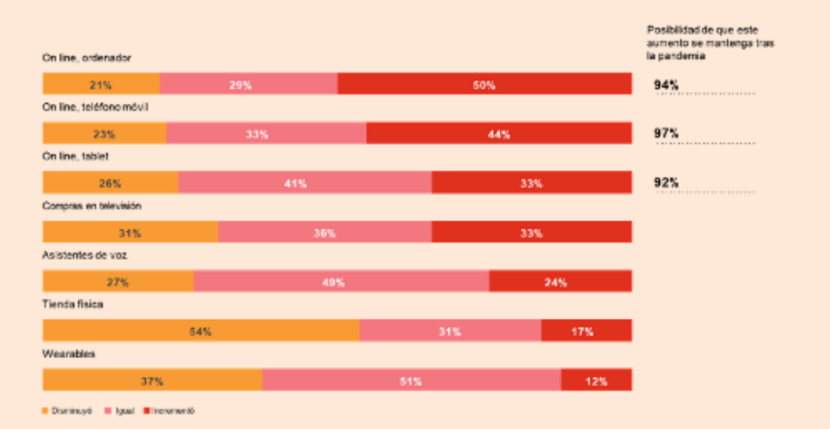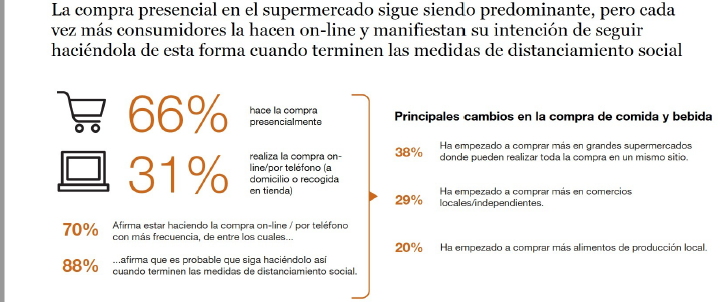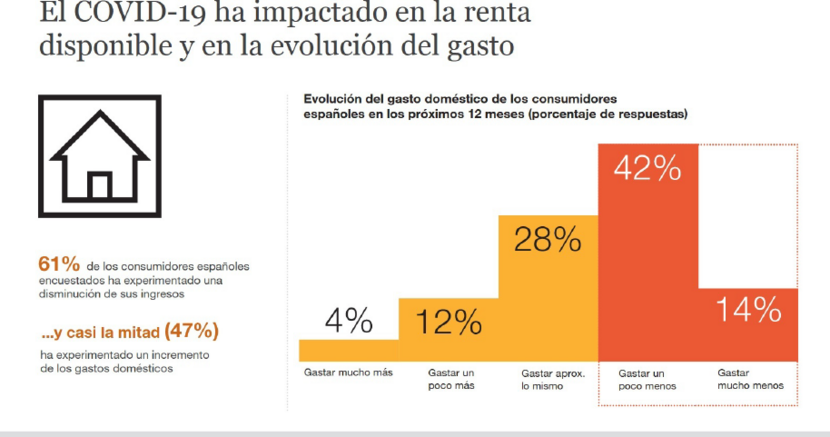How Spain’s consumption habits are changing because of the pandemic
The situation generated by COVID-19 is accelerating the changes in consumption habits that were already taking place before the pandemic. This is shown in the PwC report "Global Consumer Insights Survey 2020".

The main conclusion of the report is that online shopping is growing and falling in physical shops - except for food - while interest in products and services related to health and sustainability is increasing.
This research is based on two surveys of more than 23,000 urban consumers in 27 countries, before and after the start of the pandemic. The trend observed in its conclusion is also replicated among the Spanish consumers interviewed, with the difference that, in the Spanish case, the computer seems to be the most used alternative for online shopping. Fig. 1 shows how Spanish consumers use the purchase channels since the beginning of the social distancing measures.

Food not following the upward online trend
In the case of food shopping, the situation is different. The PwC report reveals that the physical shop continues to be the consumer's most popular alternative. This is confirmed by 60% of global consumers surveyed and 66% of Spanish consumers. However, more and more consumers are shopping food online: 35% of all consumers and 31% of Spaniards (Fig. 2). It is also clear from the responses that those who use online channels buy a greater number of products.

Fuller shopping cart but less frequent shopping
Sixty two percent of Spaniards - compared to 53% of all respondents - acknowledge that they spend more on food products than before the pandemic. In addition, there is a trend to go out less often and to go to large supermarkets to buy everything needed in a single shop.
And on which products are consumers spending more and on which less? The survey concludes that food, entertainment and media products and electronic devices and computers are the most in demand. By contrast, clothing, footwear, sports equipment and restaurants are suffering the most. A trend that is similar for both consumers as a whole and the Spanish respondents.
Sustainability and health care
On the other hand, survey responses indicate that consumers around the world are more committed to health care and sustainability.
In terms of the latter, a clear trend was already apparent before the pandemic. This refers to consumers' concern for environmental and sustainability issues when making their purchasing decisions. As an example of this, 45% try to avoid the use of plastic as much as possible.
COVID-19 impact on household income
“Global Consumer Insights Survey 2020” also asked consumers around the world about the impact of COVID-19 on their income and their responses showed that 40% of respondents - 61% of Spaniards - experienced a drop in household income. A decrease that, for 41% of consumers - 47% in Spain - has been accompanied by an increase in bills to be paid (Fig. 3).

Not surprisingly, consumer-spending expectations around the world have changed considerably. Whereas before the start of the pandemic 46% expected to consume more in the next twelve months, this percentage has now fallen to 33% and is rising to 36% who say they will spend less. In the case of Spain, 56% of respondents expect to decrease their consumption and only 16% say they will increase it (Fig. 4).

For Roberto Fernández Humada, partner in charge of Retail and Consumption at PwC, "the pandemic has accelerated trends that were already being seen, such as digitalization and sustainability, but for me the important thing is the emotional, social and economic impact that will mark our behavior as consumers in the coming years, because we are, above all, people".
Source: okdiario.com